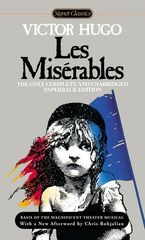Les Misérables


Les Misérables by Victor Hugo is a timeless masterpiece that tells the story of redemption and the struggle for social justice in early 19th century France. The novel is a sweeping epic that spans over several decades and follows the lives of several characters who are struggling to survive in a world that is filled with poverty, corruption, and inequality.
At the heart of the story is Jean Valjean, a man who is imprisoned for stealing a loaf of bread to feed his starving family. After serving a brutal 19-year sentence, Valjean is released from prison, but he finds that he is still not free. He is constantly pursued by Javert, a ruthless police inspector, who is determined to bring him back to prison.
Valjean's journey towards redemption begins when he meets a bishop who shows him kindness and compassion. The bishop's act of generosity changes Valjean's life, and he vows to become a better person. He starts a new life under a new identity, but he is haunted by his past and the constant threat of being discovered.
As the story unfolds, we are introduced to other characters who are struggling to survive in a world that is cruel and unforgiving. Fantine, a single mother, is forced to sell her body to provide for her daughter, Cosette. The Thénardiers, a family of innkeepers, exploit and abuse their customers, including Cosette. Marius, a young revolutionary, is torn between his love for Cosette and his duty to his cause.
Hugo's portrayal of these characters is both nuanced and compassionate. He shows us the human cost of poverty and oppression, and the lengths that people will go to in order to survive. He also shows us the power of love and redemption, and how even the most broken of individuals can find hope and redemption.
The novel is also a commentary on the social and political issues of Hugo's time. He exposes the corruption and brutality of the French justice system, and the stark inequality that existed between the rich and the poor. He also critiques the political turmoil of the time, including the failed revolution of 1832.
One of the most remarkable aspects of Les Misérables is Hugo's use of language. His prose is beautiful and poetic, and he has a remarkable ability to create vivid and memorable characters. His descriptions of the Parisian streets and the French countryside are also incredibly evocative, transporting the reader to another time and place.
Overall, Les Misérables is a masterpiece that has stood the test of time. It is a powerful and moving story that explores the human condition and the struggle for social justice. Hugo's prose is beautiful and poetic, and his characters are unforgettable. The novel is a must-read for anyone who loves great literature and wants to explore the complexities of the human experience.